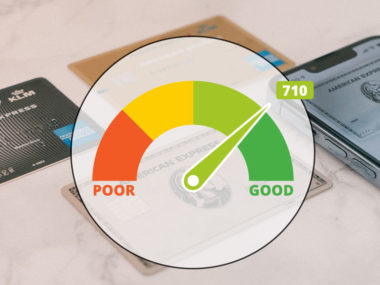Good or bad, your credit score is more than just a single number, likely delivered to you on an annual credit report. Rather, your credit report is a reflection of financial factors like credit age and type. It determines your aptitude to receive loans and repay debts.
Used by financial institutions, credit unions, and lenders when determining whether to issue you additional lines of credit, credit scores are crucial factors when you’re obtaining mortgages, personal loans, new credit cards, and more.
Whether you’ve obtained your annual credit score through your credit card company or a secure third-party credit reporting company like safe-to-use AnnualCreditReport.com, learn to regularly check and learn from your credit score reports, diagnose any potential issues, identify opportunities, and learn from regular fluctuations.
According to Experian, a multinational credit reporting agency responsible for delivering credit reports to consumers, your credit score of 730 ranks as Good. While individuals with Good credit scores have an easier time securing new loans, further improving your score should remain a priority.
Consumers with Very Good and Exceptional/Excellent scores oftentimes secure the lowest possible interest rates, the best rewards-based credit cards, and more.
Table of Contents
Why Your Credit Score Is 730
While it’s not possible to identify the exact reasons why your credit score is currently 730, we’ve outlined factors like payment history, credit age, and total hard inquiries as common influences on credit score fluctuations.
Current Payment History
Payment history is a major contributing factor to your overall credit score. With a current credit score of 730, you’ve likely made the majority of your credit card payments on time. Perhaps in the past, you’ve made one or several incomplete or late payments, which could be affecting your overall ranking.
Fortunately, there’s a simple solution when it comes to fully optimizing your payment history to improve your credit score: make 100% of your payments before they are due. While this strategy requires disciplined spending habits, it can yield positive credit score improvements and will keep you from compromised scores down the road.
Credit Age
The age of your existing credit lines goes a long way toward improving or suppressing your overall credit score. Given your current credit score of 730, it’s likely that your credit lines have existed for at least four to six months.
While this is certainly not considered credit line maturity, the fact that your loans are no longer in their infancy means your credit score can slowly reflect positive change. As long as you continue to use and regularly pay off debts, credit age will play more in your favor, and become less of a detriment to your credit score.
Recent Hard Inquiries
Hard inquiries only stay on your financial record for a single year, but they’re one of the most important factors lenders use when determining whether to issue new credit. Why?
Because hard inquiries — quick checks into your creditworthiness made by a prospective lender before providing a loan or a new credit card — indicate previous credit checks from other lenders. If lenders see other hard inquiries on your financial record, they’ll be more hesitant to add their names to the list.
Unsurprisingly, protecting your credit score means minimizing hard inquiries. With a credit score of 730, you’ve likely taken some degree of protection against unnecessary credit. Even so, seek opportunities to further minimize hard inquiries and consolidate debt into as few payments as possible.
What Can You Do With a 730 Credit Score?
From rewards-based credit cards to expedited mortgage loans, your Good credit score of 730 can allow you to unlock financial benefits and secure credit lines whenever necessary. That said, there are certainly limitations to the specifics of what a Good credit score can help you achieve.
Familiarize yourself with the available possibilities — thanks to your credit score of 730 — below.
- Personal loans are readily attainable with a credit score of 730, but you likely can’t expect to be handed one of the lowest possible interest rates.
- Still, whether you’re looking to complete renovations or fund a project, personal loans are available to individuals with Good credit scores, from respected financial institutions.
- Mortgage rates won’t be the lowest possible with a credit score of 730, given the fact that Very Good and Exceptional/Excellent scores can achieve higher loans with even more affordable interest payments.
- However, a 730 credit score is still more than sufficient to secure a mortgage for your next property.
- Rewards-based credit cards are also an option with a credit score of 730, though you’ll need to check with the individual card provider for the details.
- While certain interest-free credit cards are available for borrowers with Good credit scores, other cards that offer steeper cash-back or frequent flyer mile options may be less attainable.
- Apartment loans should be easy to secure with a credit score of 730, no matter where you’re anticipating renting.
- Especially since apartment lenders take into account the fact that borrowers don’t yet have the benefit of a mortgage on their financial records, apartment loans should be simple to land with a 730 credit score.
How to Improve a 730 Credit Score
With a credit score of 730, you won’t likely need to make any drastic moves to see systematic improvements in your monthly credit score reports. Rather, improvements here are likely to be as simple as reducing overall credit utilization (the total percentage of credit you’re currently using, when compared to your entire credit ceiling).
And don’t forget to keep doing the small things right: pay down debts before they accrue interest and navigate away from leisure-based purchases.
Improving a credit score of 730 can also mean improving your discipline when it comes to spending habits.
Spending less on unnecessary purchases or leisurely habits each month might mean you can afford to make larger payments toward loans or other debts; this will further decrease overall debt, sending overall credit utilization down and overall credit score up toward a Very Good and Exceptional/Excellent ranking.
While you don’t need to make any revolutionary changes, that isn’t to say you shouldn’t audit your loan repayment process to identify opportunities for even more efficient payment.
Whether this means submitting disputes for potential credit inaccuracies, requesting higher payment limits, or finding new ways to pay down loans, look to tailor payment strategies around credit score improvements.
Image Source: https://depositphotos.com/





